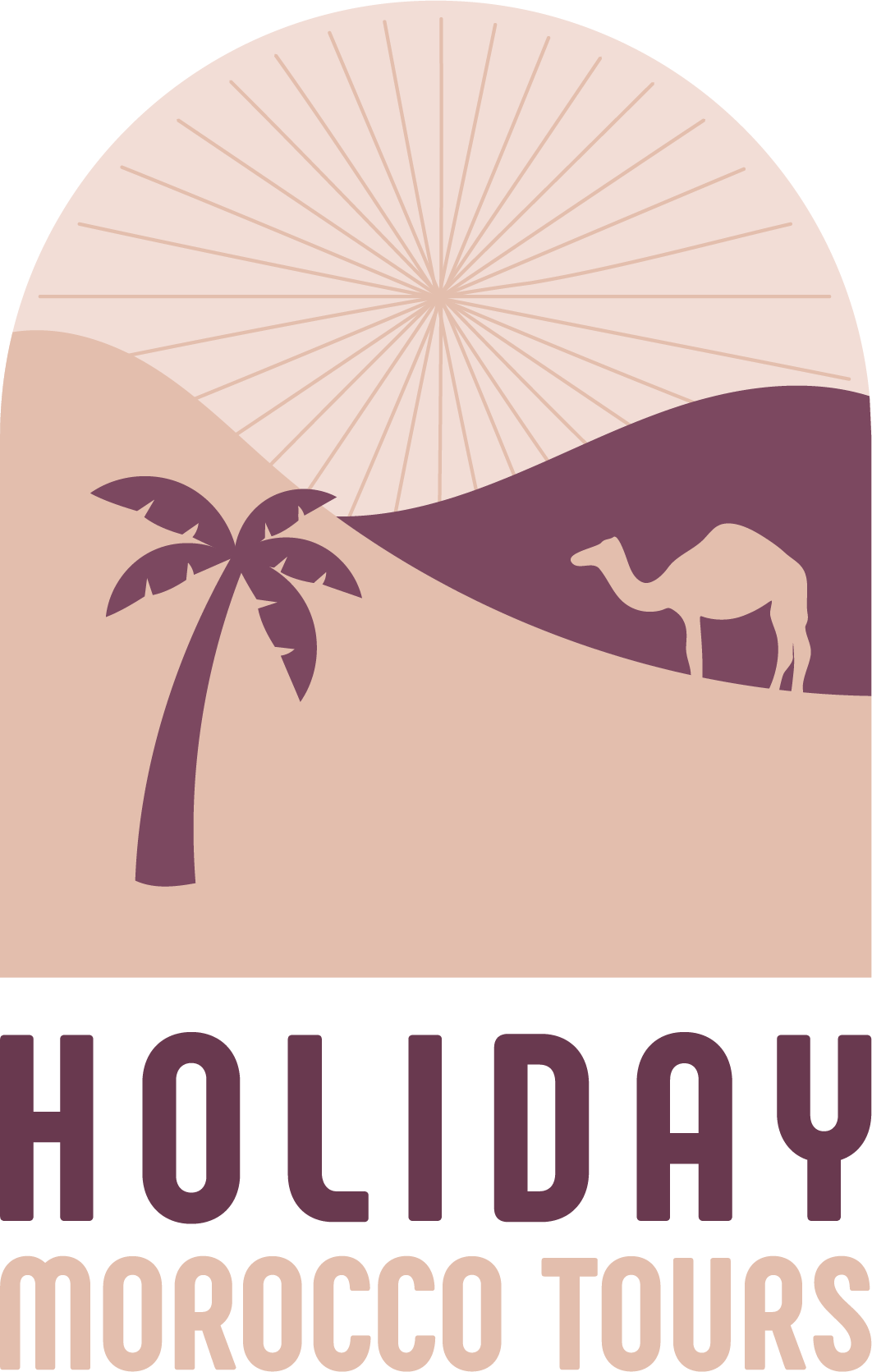Best Eco-Lodges in Morocco for Nature Lovers
Introduction: Sustainable Escapes in Morocco
Morocco is a land of contrasts — where golden deserts meet snow-capped mountains, and ancient medinas give way to peaceful oases. For travelers seeking a deeper connection with nature and culture, eco-lodges in Morocco offer the perfect balance between comfort and sustainability.
In recent years, Morocco has embraced eco-tourism as part of its national vision for sustainable development. This growing movement encourages travelers to explore the country responsibly, respecting both its fragile ecosystems and its traditional communities. From the quiet valleys of the Atlas Mountains to the endless dunes of the Sahara, eco-lodges provide a way to experience Morocco’s beauty while minimizing environmental impact.
What sets these lodges apart isn’t just their natural surroundings — it’s their commitment to preserving the environment and supporting local livelihoods. Many are built with earth, stone, and wood sourced locally, powered by solar energy, and run by Berber families who share their culture and traditions with guests. Meals are often prepared using organic produce from nearby farms, and activities focus on authentic experiences such as guided hikes, stargazing, and visits to local cooperatives.
Choosing an eco-lodge in Morocco means more than booking a place to stay — it’s a conscious decision to travel with purpose. Whether you dream of watching the sunrise over the Sahara dunes, exploring hidden Berber villages, or relaxing by the Atlantic coast, Morocco’s eco-lodges invite you to reconnect with nature, community, and yourself.
Why Choose an Eco-Lodge in Morocco?
Traveling to Morocco offers countless accommodation options — from luxurious riads to desert camps — but for nature lovers, eco-lodges in Morocco provide something far more meaningful. These sustainable stays are designed to protect the environment, empower local communities, and immerse guests in authentic Moroccan life.
1. Environmental Sustainability
Eco-lodges in Morocco are built with nature in mind. Most use renewable energy sources like solar panels, employ water-saving systems, and use locally sourced natural materials such as clay, adobe, and stone for construction. Waste is minimized through recycling programs and composting, and many properties avoid plastic altogether. By staying in such lodges, travelers directly support Morocco’s shift toward eco-friendly tourism.
2. Support for Local Communities
One of the strongest values behind Morocco’s eco-lodges is their connection to local people. Many are owned or managed by Berber families who use tourism as a way to preserve their traditions and support their villages. Guests can enjoy handmade crafts, local food, and guided tours that showcase the rhythm of rural life. Every stay helps sustain jobs, fund education, and promote fair-trade cooperatives — ensuring that tourism benefits those who call Morocco home.
3. Authentic Cultural Experiences
Eco-lodges offer something modern hotels can’t: genuine cultural immersion. Guests can participate in cooking classes, traditional bread-making, or trekking tours led by local guides. The experience goes beyond sightseeing — it’s a chance to connect with Morocco’s living heritage and appreciate the simplicity of sustainable living.
4. A Peaceful Alternative to Mass Tourism
Unlike busy resorts or crowded cities, eco-lodges are usually found in quiet, natural settings — deep in the mountains, near the desert, or along the coast. They invite travelers to slow down, unplug, and experience the true rhythm of Moroccan nature. Whether it’s listening to the wind over the dunes or watching the stars from a rooftop terrace, every moment feels more intentional and serene.
5. Alignment with Morocco’s Sustainable Vision
Morocco has become one of Africa’s leaders in environmental initiatives, investing in renewable energy projects and sustainable tourism under its Vision 2030 strategy. By choosing eco-lodges, travelers support this national goal — helping Morocco grow as a model for green tourism in the region.
In short: Staying in an eco-lodge in Morocco is not only an environmentally responsible choice but also a rewarding way to experience the country’s soul — through its people, landscapes, and traditions.
Atlas Mountains: High-Altitude Havens
The Atlas Mountains are Morocco’s green lungs, a breathtaking range stretching from the Atlantic coast to the edge of the Sahara. Dotted with Berber villages, walnut groves, and cascading waterfalls, the region offers a serene escape for travelers seeking a deep connection with nature. Here, eco-lodges in Morocco blend traditional architecture with sustainable living, using natural stone, clay, wood, solar energy, and locally sourced materials. Guests can enjoy guided hikes, cultural exchanges with Berber communities, and authentic farm-to-table cuisine. Many lodges support local artisans, women’s cooperatives, and community projects, ensuring tourism benefits residents. The lodges often feature terraces with panoramic views, cozy lounges, and open-air dining spaces. Staying here provides a unique opportunity to unplug and immerse in the natural and cultural landscape. Every visit promotes environmental awareness while preserving Morocco’s heritage. In the Atlas, comfort, tradition, and sustainability merge seamlessly. The experience leaves travelers with lasting memories and a deep appreciation for the region’s beauty and culture.
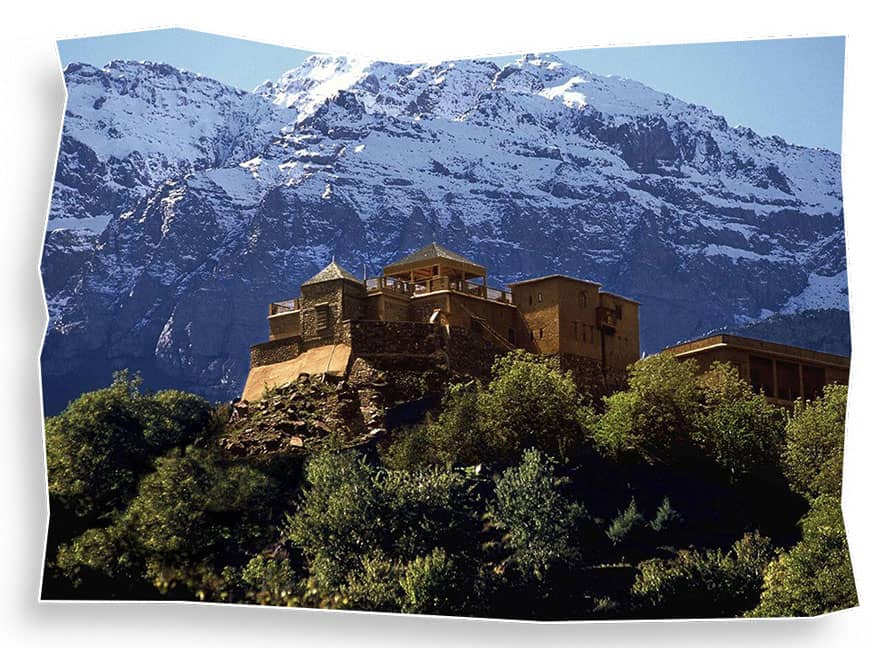
Kasbah du Toubkal – Imlil
Perched above the village of Imlil, at the foot of Mount Toubkal (North Africa’s highest peak), Kasbah du Toubkal is one of Morocco’s most celebrated eco-lodges. Built in partnership with the local Berber community, it’s powered by solar energy, employs locals, and funds education and environmental projects through the Village Association.
Guests can enjoy guided treks, mule rides, or simply relax on terraces overlooking the snow-capped peaks. The kasbah’s architecture — stone walls, carved wood, and handwoven rugs — reflects the beauty of Berber craftsmanship, while the food is prepared using organic, locally sourced ingredients.
Kasbah du Toubkal is a UNESCO Sustainable Tourism Model Project, making it a pioneer in Morocco’s eco-travel movement.
Douar Samra – Imlil
Hidden within an apple orchard above Imlil, Douar Samra feels like a page from a fairy tale. This rustic mountain retreat was built entirely with earth, wood, and stone using traditional methods. There’s no Wi-Fi or television — just candlelight, silence, and sweeping views of the mountains.
The lodge runs on solar power, serves organic vegetarian meals, and encourages guests to reconnect with nature and simplicity. Each stay helps support local farmers and artisans who supply the lodge with produce and handmade goods.
Berber Lodge – Ouirgane
Located an hour south of Marrakech, Berber Lodge in Ouirgane Valley combines elegance and environmental consciousness. Its owner, a Moroccan architect, designed it using traditional Berber materials — adobe, palm wood, and lime plaster — creating a warm and earthy atmosphere.
Solar panels heat the water, olive trees surround the property, and the cuisine is seasonal and farm-fresh. Guests can explore nearby villages, hike through the red hills, or take part in pottery and cooking workshops with locals.
Berber Lodge proves that sustainability and style can coexist beautifully.
Why the Atlas Mountains Are Ideal for Eco-Travel
-
Natural beauty: Snowy peaks, rivers, and fertile valleys make it one of Morocco’s most diverse landscapes.
-
Cultural depth: Home to Berber communities who have preserved their traditions for centuries.
-
Adventure with purpose: Trekking, biking, and village visits organized by locals ensure your travel has a positive impact.
In the Atlas Mountains, every eco-lodge stay tells a story — of craftsmanship, community, and conservation. It’s where travelers discover that luxury doesn’t need to be loud — it can whisper softly through mountain breezes and the call of village life.
Sahara Desert: Sustainable Luxury in the Dunes
Few places on Earth compare to the magic of the Sahara Desert, where vast golden dunes, shifting light, and profound silence create a timeless sense of wonder. Its fragile ecosystem calls for responsible tourism, and fortunately, eco-lodges in Morocco’s Sahara are leading the way in sustainable hospitality. These lodges combine authentic desert experiences with comfort, elegance, and eco-friendly practices such as solar power, natural building materials, and waste reduction. Guests can enjoy camel treks, stargazing under some of the clearest skies in the world, and immersive cultural experiences with Berber guides. By choosing these lodges, travelers support local communities while protecting the desert environment. In the Sahara, sustainability and luxury come together seamlessly, offering an unforgettable adventure for nature lovers and responsible travelers alike.
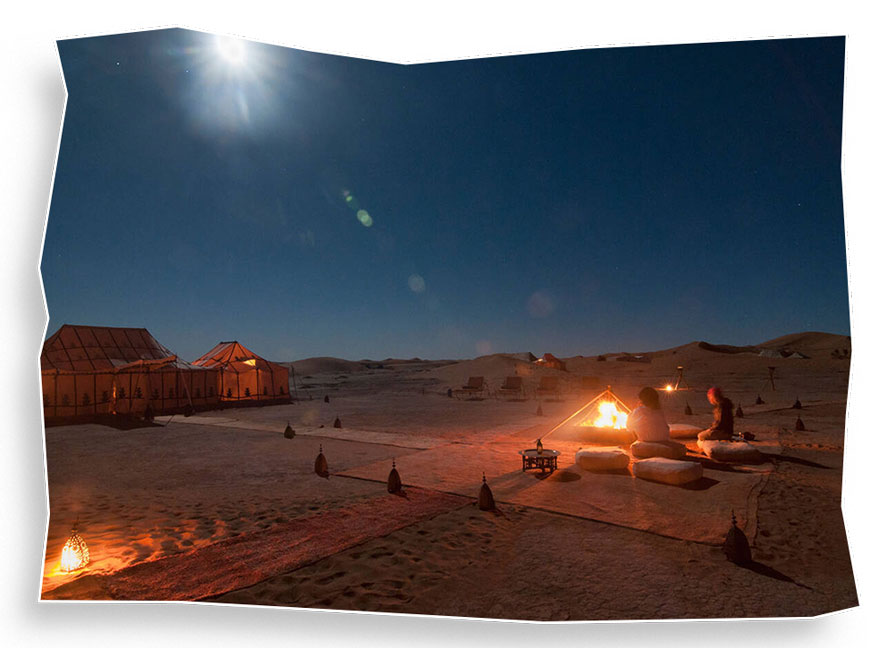
Erg Chigaga Luxury Eco Camp – Near M’Hamid
Tucked deep in the dunes near M’Hamid, Erg Chigaga Luxury Eco Camp is the definition of sustainable elegance. Accessible only by 4×4, camel, or on foot, this camp was built to leave no permanent trace on the desert.
It operates entirely on solar power, uses biodegradable products, and avoids plastic wherever possible. The camp’s tents are made from traditional materials that blend naturally into the dunes, and waste is responsibly managed through composting and recycling.
Guests can enjoy camel treks, sunset walks, and traditional drumming around the campfire, guided by local nomads who share stories about life in the Sahara. Meals feature locally sourced ingredients, cooked in the Berber style under the stars.
Eco highlight: The camp’s philosophy centers on “luxury without waste,” ensuring every stay contributes to desert conservation and local employment.
Desert Luxury Camp – Merzouga
Set near the famous Erg Chebbi dunes of Merzouga, Desert Luxury Camp strikes a balance between comfort and eco-awareness.
It runs primarily on solar energy, minimizes water use, and employs local nomads and villagers as guides and staff. The camp encourages guests to explore the desert responsibly — on camelback, by foot, or even via sandboarding adventures.
Evenings are magical here: lanterns flicker beneath an ocean of stars, and guests are treated to Amazigh (Berber) music and storytelling. Despite its name, “luxury” at this camp means simplicity with sustainability, not excess.
Camp Adounia – Erg Chebbi
Camp Adounia, meaning “the world” in Arabic, is more than a desert camp — it’s an eco-conscious experience designed to reconnect travelers with nature. Built using eco-friendly materials, it features solar lighting, composting toilets, and zero-plastic policies.
The camp’s mission is to raise awareness of environmental issues while supporting local nomadic families. Guests can join desert clean-ups, enjoy yoga sessions in the dunes, or learn about traditional desert survival techniques from local guides.
Eco tip: By choosing small, locally run desert camps like Camp Adounia, travelers directly support Morocco’s nomadic heritage and help preserve the Sahara’s fragile environment.
Why Choose an Eco-Lodge in the Sahara
-
Sustainability first: Camps are designed to minimize impact on the desert.
-
Cultural immersion: Nomadic guides share centuries-old traditions.
-
Night skies: Far from cities, the Sahara offers some of the world’s best stargazing.
-
Peace and stillness: Disconnect from technology and reconnect with the planet.
The Sahara’s eco-lodges remind travelers that sustainability doesn’t mean sacrifice — it means experiencing luxury in harmony with nature. Watching the sunrise paint the dunes gold, you realize that sometimes the greatest comfort lies in simplicity.
Ready to Experience Morocco Sustainably?
Discover the magic of Morocco through eco-lodges in Morocco — from the Sahara Desert to the Atlas Mountains and the Atlantic coast. Stay in lodges that respect nature and support local communities, immerse yourself in authentic Moroccan culture and cuisine, and enjoy unforgettable landscapes while traveling responsibly.
✨ Book your eco-lodge adventure now and make every stay count!
Coastal Retreats: Eco-Stays by the Atlantic
Morocco’s Atlantic coastline stretches over 2,000 kilometers, from the lively beaches of Agadir to the tranquil lagoons of Oualidia. Along these shores, eco-lodges in Morocco are redefining seaside hospitality, combining comfort with environmental responsibility. These lodges prioritize sustainable practices such as solar energy, water conservation, and locally sourced materials. Guests can enjoy the refreshing ocean breeze, explore nearby fishing villages, or stroll through historic medinas while minimizing their ecological footprint. Many lodges engage directly with local communities, supporting artisans, cooperatives, and cultural preservation. Farm-to-table dining highlights fresh seafood and organic produce, reflecting the region’s culinary heritage. Activities like surfing, birdwatching, and nature walks offer immersive experiences for eco-conscious travelers. Beyond relaxation, these stays promote mindful living and a deeper appreciation of Morocco’s coastal landscapes. With panoramic views and sustainable luxury, coastal eco-lodges provide the perfect blend of nature, culture, and comfort.
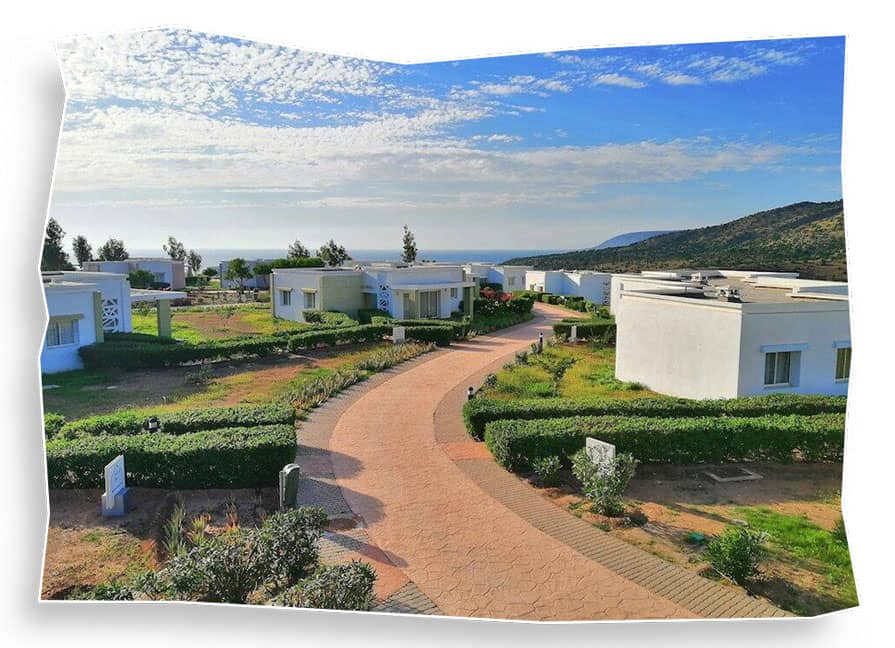
Lunja Village – Agadir
Nestled north of Agadir, Lunja Village is one of Morocco’s most ambitious eco-resorts, combining modern comfort with environmental awareness. Designed to preserve local biodiversity and reduce carbon emissions, the village operates on renewable energy, incorporates water recycling systems, and encourages guests to participate in green initiatives.
Its architecture mirrors Morocco’s coastal landscapes, using natural stone and clay tones that blend seamlessly into the surroundings. Guests can enjoy surfing, cycling, or exploring nearby Argan forests while staying in energy-efficient chalets surrounded by gardens that attract local birdlife.
Eco highlight: Lunja Village has implemented a “green footprint” policy, ensuring waste reduction and local community involvement in all operations.
Villa Maroc – Essaouira
In the heart of the historic port city of Essaouira, Villa Maroc is an elegant riad-turned-eco-lodge that combines heritage and sustainability. This 18th-century residence was restored using traditional Moroccan materials, preserving its authenticity while incorporating eco-friendly upgrades such as solar water heating and energy-efficient systems.
The lodge works closely with local fishermen, artisans, and cooperatives, ensuring that every aspect of the guest experience supports the local economy.
Guests can enjoy rooftop breakfasts overlooking the ocean, stroll through the medina, or visit nearby Argan oil cooperatives to see sustainable production firsthand.
Why stay here: Villa Maroc is a prime example of urban eco-conscious living — proof that sustainability can thrive even in Morocco’s historic coastal cities.
Azalai Beach Cottage – Oualidia
Located between Casablanca and Essaouira, in the tranquil coastal town of Oualidia, Azalai Beach Cottage is a sanctuary for nature lovers. Set against a backdrop of lagoon and ocean views, it uses solar power, natural insulation materials, and recycled water systems to minimize its environmental impact.
Each cottage is decorated with eco-friendly materials — driftwood furniture, handmade ceramics, and linen textiles — creating a rustic yet refined atmosphere. The restaurant serves organic, locally sourced seafood and produce from nearby farms.
The surrounding lagoon, a protected bird reserve, makes Azalai ideal for birdwatchers, surfers, and eco-travelers alike.
Eco tip: Oualidia’s lagoon attracts flamingos, herons, and egrets — a paradise for sustainable birdwatching and photography.
Why Morocco’s Coast Is Perfect for Eco-Travel
-
Biodiversity: Home to marine reserves, wetlands, and migratory birds.
-
Cultural charm: Fishing villages and medinas reflect Morocco’s maritime heritage.
-
Mindful relaxation: Yoga retreats, surf schools, and nature lodges promote slow, responsible tourism.
From Agadir’s golden beaches to Oualidia’s peaceful lagoons, Morocco’s coastal eco-lodges invite travelers to experience the rhythm of the ocean while caring for the planet.
Hidden Oases and Desert Valleys
Beyond Morocco’s cities and coastlines lies a hidden world of lush palm groves, fertile valleys, and ancient kasbahs surrounded by desert landscapes. These regions are home to some of the most peaceful and community-focused eco-lodges in Morocco, where sustainability and authenticity come together naturally. Staying in these oases offers a slower, more soulful rhythm, where every moment is shaped by simplicity, tradition, and respect for the land. Guests can explore local villages, enjoy farm-to-table meals, and participate in cultural workshops led by Berber communities. Eco-lodges here often use solar energy, adobe construction, and recycled water systems, blending comfort with environmental responsibility. The surrounding landscapes — palm groves, rivers, and desert gardens — provide breathtaking scenery and a haven for wildlife. Whether hiking through valleys, visiting kasbahs, or simply relaxing under date palms, travelers experience Morocco in its most genuine form. These hidden retreats demonstrate how tourism can nurture both nature and local communities while offering unforgettable experiences.
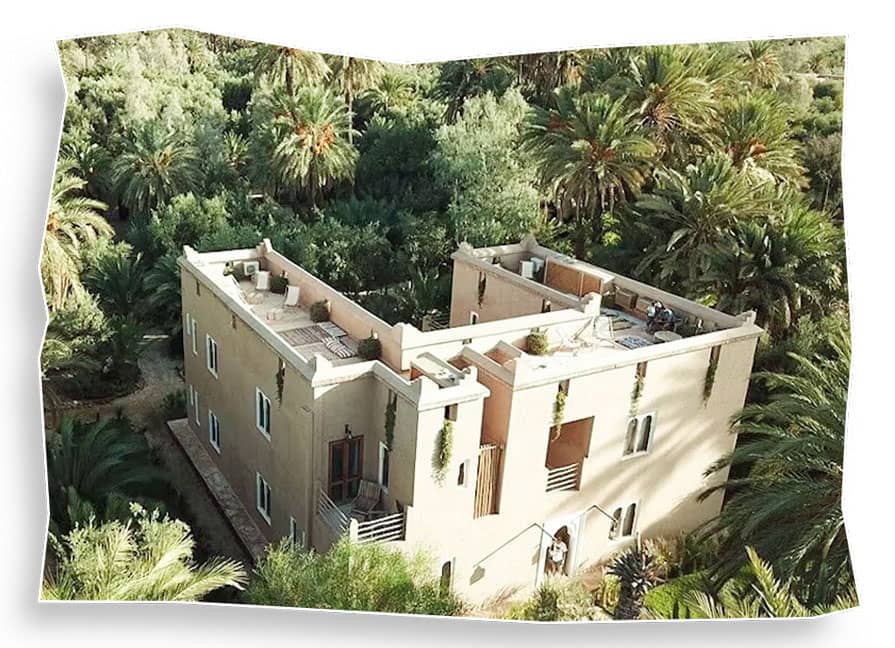
L’Ma Lodge – Skoura Oasis
Tucked within the Skoura palm grove, L’Ma Lodge is an eco-oasis that beautifully balances comfort and conscience. Built with adobe and natural stone, the lodge blends seamlessly into its palm-filled surroundings. Solar panels provide energy, while the gardens are watered using a traditional irrigation system (khettara).
Guests are treated to farm-to-table meals prepared with seasonal produce from the on-site organic garden. The lodge also supports local cooperatives by sourcing handmade decor and encouraging guests to visit artisans in the nearby village.
You can relax by the pool shaded by olive trees or explore the surrounding Kasbah Amridil, one of Morocco’s best-preserved earthen fortresses.
Eco highlight: L’Ma Lodge is part of Morocco’s “Green Key” initiative, recognizing establishments with strong sustainability practices.
Ecolodge Atlas Kasbah – Agadir Region
Located in the foothills of the Anti-Atlas Mountains, just outside Agadir, Atlas Kasbah Ecolodge is a pioneer in responsible tourism. Built from local stone and earth, it operates on solar energy, uses composting toilets, and has achieved international eco-certification (Green Key and Responsible Tourism Awards).
Guests can join cultural workshops, such as argan oil production, pottery, and Amazigh cooking classes — all led by local villagers. The ecolodge also partners with schools and NGOs to promote environmental education and women’s empowerment in the region.
The result is an immersive, meaningful stay that connects travelers directly with Morocco’s people and planet.
Recognition: Atlas Kasbah was the first ecolodge in North Africa to receive a UNESCO label for sustainable tourism.
Dar Itrane – Aït Bouguemez Valley (Happy Valley)
In the heart of the Aït Bouguemez Valley, known as the “Happy Valley” of the High Atlas, lies Dar Itrane, a true gem for eco-conscious travelers. Built entirely from adobe, wood, and stone, this eco-lodge was designed to preserve traditional Berber architecture while supporting the local community.
It runs on solar power, sources food from nearby farms, and supports local education initiatives through a community foundation. Guests can join guided treks, village visits, or cultural exchanges that showcase daily mountain life.
The calm atmosphere, panoramic views, and heartfelt hospitality make Dar Itrane a model of eco-luxury rooted in authenticity.
Eco philosophy: “Respect for the land, dignity for the people, and balance between comfort and culture.”
Why Stay in Morocco’s Hidden Valleys and Oases
-
True immersion: Live close to nature and local traditions.
-
Community impact: Your stay helps sustain villages and protect cultural heritage.
-
Natural beauty: Palm groves, kasbahs, and desert gardens offer unforgettable scenery.
These oases and valleys show another side of eco-lodges in Morocco — one where sustainability is not a trend, but a way of life passed down through generations.
What to Expect at a Moroccan Eco-Lodge
Staying in one of the many eco-lodges in Morocco is more than just an overnight experience — it’s a journey into a different rhythm of life. These places invite travelers to slow down, breathe deeply, and enjoy Morocco’s landscapes in their purest form. While every eco-lodge is unique, they all share a common philosophy: harmony between comfort, culture, and conservation.
Simplicity with Comfort
Don’t expect flashy luxury — instead, you’ll find thoughtful design and natural elegance. Rooms are built with local materials such as clay, tadelakt plaster, and palm wood, keeping interiors cool in summer and warm in winter. Many lodges use solar power, rainwater collection systems, and handcrafted furnishings made by local artisans.
The goal isn’t extravagance — it’s authenticity. You might sleep under handwoven blankets, dine by candlelight, and wake up to the sound of birds instead of city noise.
Farm-to-Table Dining
Food is at the heart of every eco-lodge experience. Most serve traditional Moroccan cuisine made with organic ingredients grown nearby — vegetables from on-site gardens, olive oil from local presses, and bread baked fresh in clay ovens.
Expect dishes like tagine with seasonal vegetables, couscous with local herbs, and fresh mint tea sweetened with honey from village beekeepers.
Meals are often shared in communal spaces, creating a warm atmosphere that encourages conversation and cultural exchange.
Eco tip: Many lodges offer cooking workshops where you can learn sustainable Moroccan recipes using ingredients you’ve picked from the garden.
Connection with Nature
Every eco-lodge is designed to help guests reconnect with the natural world. Whether you’re surrounded by mountains, desert dunes, or the sea, you’ll find open terraces, gardens, and quiet spaces for reflection.
Guests are encouraged to explore nearby trails, join guided nature walks, or simply relax with a book beneath a palm tree. The night skies in remote areas — especially in the desert and mountains — are among the clearest in the world, perfect for stargazing.
Cultural Immersion
What truly sets eco-lodges in Morocco apart is the cultural connection they offer. Many are family-run, and hosts treat guests like part of the household. You might be invited to share mint tea with your hosts, visit a women’s cooperative, or learn to bake traditional bread in an outdoor clay oven.
This human connection transforms your stay from a simple visit into a meaningful cultural exchange — one that supports local livelihoods and builds lasting memories.
Mindful Experiences
Activities at Moroccan eco-lodges often focus on wellness and sustainability:
-
Yoga and meditation retreats in the desert or mountains.
-
Hiking and trekking with local guides.
-
Workshops on pottery, weaving, or argan oil production.
-
Community projects, like helping in local gardens or visiting schools.
Everything is designed to create balance — between you, the land, and the people who care for it.
In short:
At a Moroccan eco-lodge, luxury isn’t measured in stars — it’s measured in peace, purpose, and connection. It’s where every sunrise, meal, and conversation reminds you that travel can be both beautiful and responsible.
How to Travel Responsibly in Morocco
Choosing to stay in eco-lodges in Morocco is an excellent start toward responsible travel — but sustainable tourism goes beyond where you sleep. It’s about how you explore, what you support, and the respect you show toward people and nature. By making mindful choices, every traveler can help protect Morocco’s landscapes and cultures for generations to come.
1. Choose Local and Sustainable Accommodations
Whenever possible, stay in locally owned eco-lodges, riads, or guesthouses that give back to their communities. These places reinvest profits into local projects, employ residents, and often use renewable energy or organic farming.
Before booking, look for eco-certifications such as Green Key, Travelife, or Responsible Tourism Awards, which guarantee strong environmental standards.
Tip: Small eco-lodges in Morocco often have the biggest impact — they operate on traditional land, use local materials, and offer authentic hospitality.
2. Support Local Artisans and Cooperatives
Morocco’s souks and villages are full of handmade treasures — ceramics, rugs, argan oil, and jewelry. Buying directly from artisans or cooperatives, especially those run by women, ensures your money supports fair wages and keeps ancient crafts alive.
When visiting rural areas, ask your lodge or guide to recommend ethical shopping options that promote sustainable trade.
3. Reduce Plastic and Waste
Plastic pollution is a growing global issue, and Morocco is taking steps to reduce it. Travelers can help by:
-
Bringing a reusable water bottle and refilling it at the lodge.
-
Avoiding single-use plastic bags and straws.
-
Packing eco-friendly toiletries and biodegradable soaps.
Many eco-lodges already have systems for recycling and composting, so doing your part makes a real difference.
4. Respect Local Culture and Customs
Morocco’s culture is deeply rooted in Islamic values, hospitality, and community respect. Dress modestly, especially in rural areas; ask before photographing people; and greet locals politely in Arabic or Amazigh (Berber) when possible.
Eco-tourism isn’t only about nature — it’s about cultural preservation, too. Treating traditions with care ensures that communities remain proud of sharing their heritage.
Cultural note: Simple gestures like learning to say “shukran” (thank you) or “salaam alaikum” (peace be upon you) show appreciation and openness.
5. Travel Low-Impact
Explore Morocco in ways that reduce your carbon footprint:
-
Take shared transport like trains or buses between cities.
-
Walk, hike, or cycle when exploring villages or valleys.
-
Offset your flights by donating to reforestation or renewable energy projects in Morocco.
These choices not only reduce emissions but also allow you to see the country at a slower, more meaningful pace.
6. Engage in Community and Nature Projects
Many eco-lodges organize volunteering or learning programs — from helping plant trees in oases to supporting women’s education projects. Participating in such initiatives deepens your understanding of Morocco and leaves a positive footprint behind.
7. Leave No Trace
Whether you’re trekking in the Atlas, camping in the Sahara, or lounging by the coast, always follow the “Leave No Trace” principle:
-
Take all your waste with you.
-
Stick to existing paths and trails.
-
Avoid disturbing wildlife or natural formations.
Even small acts of mindfulness help preserve Morocco’s diverse landscapes for the next traveler.
Conclusion: Reconnect with Nature the Moroccan Way
Morocco is a land of contrasts — from towering Atlas peaks and endless Sahara dunes to tranquil oases and breezy Atlantic shores. Choosing to stay in eco-lodges in Morocco allows travelers to experience this beauty responsibly, immersing themselves in nature, culture, and local life without leaving a harmful footprint.
Every eco-lodge tells a story — of sustainability, tradition, and community. Whether it’s sharing mint tea with a Berber family in the mountains, watching the sunset over golden desert dunes, or listening to waves crash along a pristine coastline, these experiences create memories that last a lifetime.
By traveling thoughtfully, supporting local communities, and embracing eco-friendly accommodations, you not only enjoy a richer, more authentic journey — you also help preserve Morocco’s landscapes, wildlife, and heritage for future generations.
In short: Morocco’s eco-lodges are more than just a place to stay — they are gateways to a deeper connection with the land, its people, and the rhythms of life. For every nature lover, adventurer, and mindful traveler, they offer a way to explore Morocco sustainably, responsibly, and beautifully.
